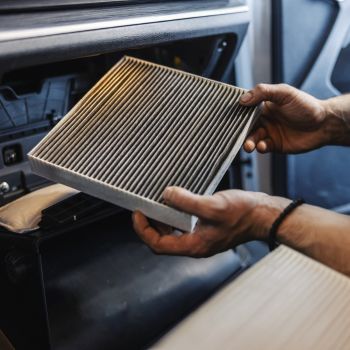 Most vehicles come with two essential air filters: one for the engine and another for the cabin. The engine air filter ensures that only clean air reaches your car’s engine, protecting it from dirt and dust that could cause damage over time. Meanwhile, the cabin air filter keeps harmful particles, pollen, and allergens out of the passenger area, helping to maintain a healthier and more comfortable environment inside your car.
Most vehicles come with two essential air filters: one for the engine and another for the cabin. The engine air filter ensures that only clean air reaches your car’s engine, protecting it from dirt and dust that could cause damage over time. Meanwhile, the cabin air filter keeps harmful particles, pollen, and allergens out of the passenger area, helping to maintain a healthier and more comfortable environment inside your car.
Over time, both filters can become clogged with debris, reducing their effectiveness. A dirty engine filter can lead to poor performance, increased fuel consumption, and even engine damage. Similarly, a clogged cabin filter may result in unpleasant odors, reduced airflow, and worsened air quality for passengers. It's important to know when and how to replace or clean these filters to keep your vehicle running smoothly and efficiently.
The Importance of Air Filters
Cabin air filters play a crucial role in maintaining indoor air quality. They trap pollutants such as pollen, smoke, and dust, preventing them from circulating through your car. When this filter becomes dirty, it can cause breathing issues, especially for people with allergies or respiratory conditions. In contrast, the engine air filter protects your car’s internal components by filtering out contaminants before they reach the engine. Without a properly functioning engine filter, dirt and debris can accumulate in critical areas, leading to decreased performance and higher fuel costs.
Both types of filters are typically made from materials like paper, synthetic fibers, or fabric, designed to capture fine particles while allowing air to flow freely. A new or cleaned filter can trap particles as small as 5 to 10 microns, ensuring cleaner air for both you and your vehicle.
How Often Should You Replace Your Air Filter?
As a general guideline, most manufacturers recommend replacing your engine air filter every 12,000 to 15,000 miles or once a year, whichever comes first. However, driving conditions can significantly affect this timeline. If you frequently drive in dusty, polluted, or high-moisture environments, or if you often travel on unpaved roads or off-road, you may need to replace your filter more often. Additionally, hot climates or heavy traffic can also speed up the buildup of dirt and grime in your filters.
Signs That Your Air Filter Needs Replacement
Some cars have built-in indicators that change color when it's time to replace the filter. If not, watch for the following signs:
- Decreased fuel efficiency
- Engine misfiring or rough idling
- Check Engine light coming on
- Failed emissions test
- Hissing or whistling sounds when the engine is off
- Sluggish acceleration or uneven power delivery
If your cabin air filter is dirty, you might notice a strong smell inside your car—like mold or mildew—or feel less airflow from the vents. These are clear signals that it's time for a replacement.
Keeping your air filters clean and well-maintained is an easy way to improve your car’s performance, save on fuel, and ensure a healthier ride for everyone inside. Don’t ignore the signs—schedule a service appointment with DaSilva’s Auto Body today to have your filters inspected and replaced if needed.
Shaping Machine,Post Treatment Machine,Shell Vibrator Machine,Sand Blasting Machine
Dongying Fuhao Precision Casting Science & Technology Co.,Ltd , https://www.fh-cast.com